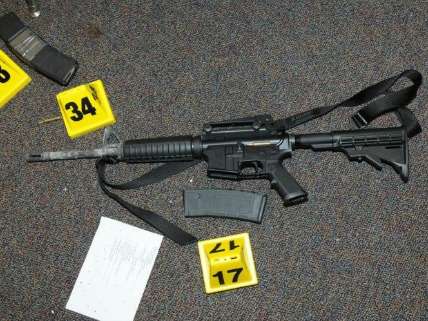4th Circuit Upholds Maryland's 'Assault Weapon' Ban
The appeals court says the prohibited guns and magazines are outside the scope of the Second Amendment.

Yesterday a federal appeals court upheld Maryland's ban on so-called assault weapons, saying ownership of such guns is "not protected by the Second Amendment." The decision, by the U.S. Court of Appeals for the 4th Circuit, overturned a 2016 ruling by a three-judge panel of the same court that said Maryland's law should be subject to "strict scrutiny" because it imposes a "substantial burden" on the right to keep and bear arms.
Maryland's "assault weapon" ban, which it expanded after the 2012 massacre at Sandy Hook Elementary School in Newtown, Connecticut, bans the sale or transfer of 81 listed gun models, along with "their copies," plus all semiautomatic centerfire rifles that accept detachable magazines and have two or more of these features: a folding stock, a grenade/flare launcher, or a flash suppressor. The law also bans the sale or transfer of magazines than can hold more than 10 rounds. Violators (buyers as well as sellers) can go to prison for up to three years.
The question at the heart of the case, Kolbe v. Hogan, is whether the guns and magazines that Maryland banned qualify as "dangerous and unusual weapons," which the Supreme Court has indicated are outside the scope of the Second Amendment. That category, the Court said in the landmark Second Amendment case District of Columbia v. Heller, includes "weapons that are most useful in military service—M-16 rifles and the like." By contrast, weapons "in common use for lawful purposes" are included in the constitutional right to armed self-defense.
In Kolbe, the 10-judge majority concludes that the guns and magazines covered by Maryland's ban are "dangerous and unusual" because they are "exceptionally lethal weapons of war" that are not appropriate for civilian use: "We are convinced that the banned assault weapons and large-capacity magazines are among those arms that are 'like' 'M-16 rifles'—'weapons that are most useful in military service'—which the Heller Court singled out as being beyond the Second Amendment's reach." The four dissenters, by contrast, note that "assault weapons" and "large-capacity magazines" are indisputably "in common use for lawful purposes," since they are owned by millions of law-abiding Americans: "As long as the weapon chosen is one commonly possessed by the American people for lawful purposes—and the rifles at issue here most certainly are—the state has very little say about whether its citizens should keep it in their homes for protection."
Contrary to the majority's assertion that the guns Maryland banned are similar to the M-16, none of them is capable of automatic fire. The majority's judgment that folding stocks, flare launchers, and flash suppressors make rifles "exceptionally lethal" is dubious. It is also irrelevant, because the Supreme Court did not say the Second Amendment allows bans on exceptionally lethal weapons. It said the Second Amendment allows bans on "dangerous and unusual" weapons that are not "in common use for lawful purposes," and that description plainly does not apply to rifles that are among the most popular in the country. The argument that magazines capable of holding more than 10 rounds are more lethal than smaller magazines is more logical but still irrelevant, since "large-capacity magazines" are very common, sold standard with many handguns and rifles.
Despite the apparent conflict with Heller (and with McDonald v. Chicago, which extended Heller's logic to state and local governments), the Supreme Court so far has not agreed to review any decisions dealing with "assault weapon" bans. In addition to the 4th Circuit, two other federal appeals courts—the D.C. Circuit and the 7th Circuit—have upheld such laws since Heller, while the 9th Circuit has upheld a local law restricting magazine size.
In 2015, when the Supreme Court declined to hear an appeal of the 7th Circuit's decision, Justice Clarence Thomas vigorously dissented. "The Seventh Circuit ultimately upheld a ban on many common semiautomatic firearms based on speculation about the law's potential policy benefits," Thomas wrote. "If a broad ban on firearms can be upheld based on conjecture that the public might feel safer (while being no safer at all), then the Second Amendment guarantees nothing….The overwhelming majority of citizens who own and use such rifles do so for lawful purposes, including self-defense and target shooting. Under our precedents, that is all that is needed for citizens to have a right under the Second Amendment to keep such weapons."
While both the D.C. Circuit and the 7th Circuit recognized (or assumed) that "assault weapon" bans implicate the Second Amendment, even if they ultimately pass constitutional muster, the 4th Circuit says Maryland's law has nothing to do with the constitutional right to keep and bear arms. "In concluding that the Second Amendment does not even apply," the dissenters say, "the majority has gone to greater lengths than any other court to eviscerate the constitutionally guaranteed right to keep and bear arms."


Show Comments (193)